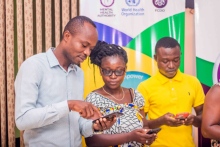Focused interventions to strengthen mental health service delivery in Ghana
Context
The impact of the risks to mental health and associated disorders continue to undermine the attainment of the highest standard of health in African countries. The burden of increasing prevalence of mental health disorders is compounded by limited access to quality mental health services, and the exclusion of affected people from productive likelihoods.
In Ghana, support from World Health Organization (WHO) and other partners to the Ministry of Health has however resulted in notable advances in this lower- to middle-income country in West Africa, where an estimated 2.5 million of the total 30-million strong population live with mental, neurological and substance abuse (MNS) disorders .
The prevalence of common MNS disorders, such as epilepsy, major depression and drug use disorders, are higher in Ghana compared to the African regional average – yet fewer than a quarter of all MNS patients receive the care and treatment they need. This contributes to a reality in which Ghana’s age-standardized suicide rate among men is 20 per 100 000, higher than the regional average of 18 per 100 000.
Despite investments made in the last two decades, major gaps remain in delivery of quality mental health services to communities. In response, with support from WHO and other partners, the government of Ghana conducted targeted assessments and identified the following priority target areas for action: strengthening policy environment, leadership and resource mobilization; integrating mental health care into Essential Health Services; and improving quality of care through a human rights-based approach.
Interventions implemented with support from WHO
The WHO and its partners supported the Ministry of Health in Ghana to:
- Identify service delivery gaps through three targeted assessments: quality of care utilizing the WHO Quality Rights Toolkit (Quality Rights assessments), investment case analysis (Mental Health Investment case) and WHO AIMS report for Ghana; and costing of mental health services, using the One Health Tool.
- Strengthen governance by deploying technical expertise, improving the operations of the Mental Health Authority, establishing a Mental Health Board, updating national and regional implementation and strategic plans, and initiating regular coordination meetings with key stakeholders.
- Strengthen integration of mental health into essential health care through the Mental Health Gap Strategy; training using the MHGAP tool was conducted in four regions. MHGAP is being integrated into primary health care through the KENTE NCD Multisectoral Project, as well as through Special Initiative for Mental Health activities.
These interventions were implemented with leadership from the Ministry of Health, the Mental Health Authority, Ghana Health Services and the regions, and in collaboration with the Kente NCD Project, the WHO Special Initiative for Mental Health, with funding support of NORAD, UK-DHSC and United Kingdom Foreign, Commonwealth & Development Office (UK-FCDO), and WHO SIMH funding (NORAD and USAID).
Key achievements
The three targeted assessments of mental health services in Ghana identified the following key gaps:
- Lack of mental health care at tertiary and secondary level, with only seven primary level facilities providing mental health services.
- Inadequate support for those with MNS disorders to attain highest standard of health and living conditions. Similarly, the right to independent living was severely compromised.
- Quality rights orientation and training transformed mental health care in health facilities and communities. The investment case and costing of mental health services provided the best evidence to support investment to integrate mental health into essential health services, including the National Health Insurance.
On improvement of governance, a mental health technical officer was deployed to the country office in November 2020, and the National Level Mental Health Coordination Committee was initiated by WHO, and subsequently chaired by the Ghana Mental Health Authority.
Stakeholders’ coordination and resource mobilization improved. WHO supported the launch of the Kente NCD Project (2020–2025) with the aim of progressively expanding integration of noncommunicable diseases/mental health prevention, screening, clinical care, rehabilitative and palliative care, as well as provision of technologies and medicines in a people-centered approach.
Improved governance led to the prioritization and integration of mental health services into the national package of essential services at primary health care level. WHO also supported the development of training materials and facilitated trainings of trainers. The Organization further supported the development of training materials and facilitated training of trainers and downstream training for 395 public health workers from four regions (Ashanti, Bono, Central and Eastern).
Ghana became the second country in the African Region to implement the Special Initiative on Mental Health (SIMH) in 2020. The initiative has supported regular participation of key stakeholders in planning and implementation of mental health action plans at national level, and in four prioritized regions. To strengthen integration of mental health care into essential health services, the training of mental health specialists as trainers, and of general health care workers, using MhGAP was conducted.
Additionally, the Health Ministry, with support from WHO and funding from UK-FCDO), implemented the WHO Quality Rights Initiative to improve quality of care and promote the human rights of people living with mental health conditions. Ghana started implementation of this initiative in 2018, becoming the first country worldwide to roll it out on a national scale. Face-to-face and e-training of mental health service providers, caregivers, teachers, police services personnel, social welfare and judicial services staff, and affected people, was conducted. A total of 24 592 people were certified, and the successes were documented and widely disseminated. The Mental Health Authority made it mandatory for all staff working in a psychiatric facility to have a Quality Rights certificate.
WHO has supported Ghana to carry out a STEPs survey containing a comprehensive mental health module. The STEPS tool being used in Ghana includes the nine-item Patient Health Questionnaire (PHQ-9), a widely used screening instrument for depression. The STEPS survey will further contribute to evidence for alignment of mental health programming with the needs of communities.
Conclusion
The strategic interventions supported by WHO and partners have enabled Ghana to identify the gaps that hinder progress towards improving mental health services and reducing the burden. Capacities at national and regional level have improved, through hbetter technical support, better operations of the Mental Health Authority and improved stakeholder participation at all levels. Skills for delivery of quality and human rights-based mental health services have also been improved. Evidence to support resource mobilization and allocation was provided, and will be further strengthened through the STEPS survey.
###########
References;
Ghana 2021 Population and Housing Census. Ghana Statistical Service (GSS) - 2021 PHC Report - PDF (flatprofile.com)
WHO (2021) Suicide Worldwide in 2019: global health estimates. Geneva: World Health Organization; 2021. Licence: CC BY-NC-SA 3.0 IGO 5.
Ghana-investment-case_final.pdf (who.int)
Francesca M.M., Giovani M.C., Akwasi o., et al (2022). Nationwide evaluation study of the quality of care and respect of human rights in mental health facilities in Ghana: results from the World Health Organization Quality Rights initiative. BMC Public Health. 2022; 22: 639
WHO Special Initiative for Mental Health – Situation Assessment Ghana - WHO Special Initiative for Mental Health

